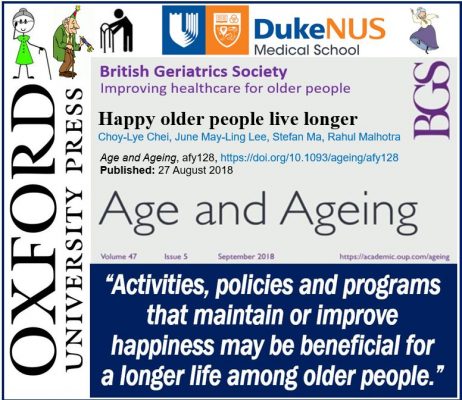Happy older people have longer lifespans, researchers found in a new study. Researchers at Duke-NUS Medical School in Singapore wrote about their study and findings in Age and Ageing (citation below). Age and Ageing is the British Geriatrics Society’s scientific journal.
According to the authors, greater happiness is directly proportional with lower mortality.
Rahul Malhotra and colleagues utilized data for 4,478 participants of a nationally-representative survey. The survey looked at the association between and likelihood of dying due to any cause.
The authors examined data from 2009 to the end of 2015. Senior author, Assistant Professor Malhotra, is Head of Research at Duke-NUS’ Centre for Ageing Research and Education.
Older people – assessing happiness
The researchers assessed happiness by asking the participants how often they experienced the following in the past week: ‘I enjoyed life,’ ‘I felt happy,’ and ‘I felt hope about the future.’
The authors considered their responses in two different ways:
– With a happiness score.
– With a binary happiness variable – Happy/Unhappy.
In their analysis, the researchers accounted for a wide range of demographics, social factors, and lifestyle choices. They also accounted for health factors.
As you get older mobility becomes an issue and you need home solutions.

In an Abstract that precedes the main article in the journal, the authors wrote: “Happiness is associated with reduced likelihood of all-cause mortality among older people in an Asian population, with the benefit observed even for incremental increases in happiness.”
Unhappy vs. happy older people
The study found that fifteen percent of happy older people passed away between 2009 to the end of 2015. In contrast, over the same period, twenty percent of the unhappy seniors passed away.
For each one-point increase on the happiness score, there was a nine-percent reduction in the chance of dying from any cause. In other words, the happier an older person is, the longer they are likely to live.
Happy seniors had a nineteen percent lower chance of dying from any cause than unhappy seniors.
Inverse association of happiness with mortality
Additionally, the inverse association of happiness with mortality was present consistently among both women and men. The inverse association was also consistently present among young seniors (60-79 years) and old seniors (75+).
Prof. Malhotra said:
“The findings indicate that even small increments in happiness may be beneficial to older people’s longevity.”
“Therefore individual-level activities as well as government policies and programs that maintain or improve happiness or psychological well-being may contribute to a longer life among older people.”
Regarding the inverse association of happiness with mortality, co-author Prof. June May-Ling said:
“The consistency of the inverse association of happiness with mortality across age groups and gender is insightful – men and women, the young-old and the old-old, all are likely to benefit from an increase in happiness.”
June May-Ling is Research Associate at the Centre for Ageing Research and Education at Duke-NUS.
Older people – happiness and better health
There has been growing interest in the pursuit of happiness for older people. There has also been growing interest in better health for seniors.
Previous studies showed a link between happiness, positive emotions, and better health outcomes. However, evidence linking happiness to longer expected lifespans was inconclusive.
Expected lifespan, in this context, means the same as life expectancy, i.e., how long people are expected to live.
Many previous studies did initially record more happiness with a lower risk of premature death. However, once the differences in health, lifestyle, and demographics were factored in, the link disappeared.
The authors claim that theirs is one of the few Asian studies that showed an association between happiness and mortality among older people.
Their study took into account such variables as social work and loneliness. They, therefore, extended the generalizability of the findings to non-Western populations.
Citation
“Happy older people live longer,” Choy-Lye Chei, June May-Ling Lee, Stefan Ma, and Rahul Malhotra. Age and Ageing, afy128, https://doi.org/10.1093/ageing/afy128. Published: 27 August 2018.
